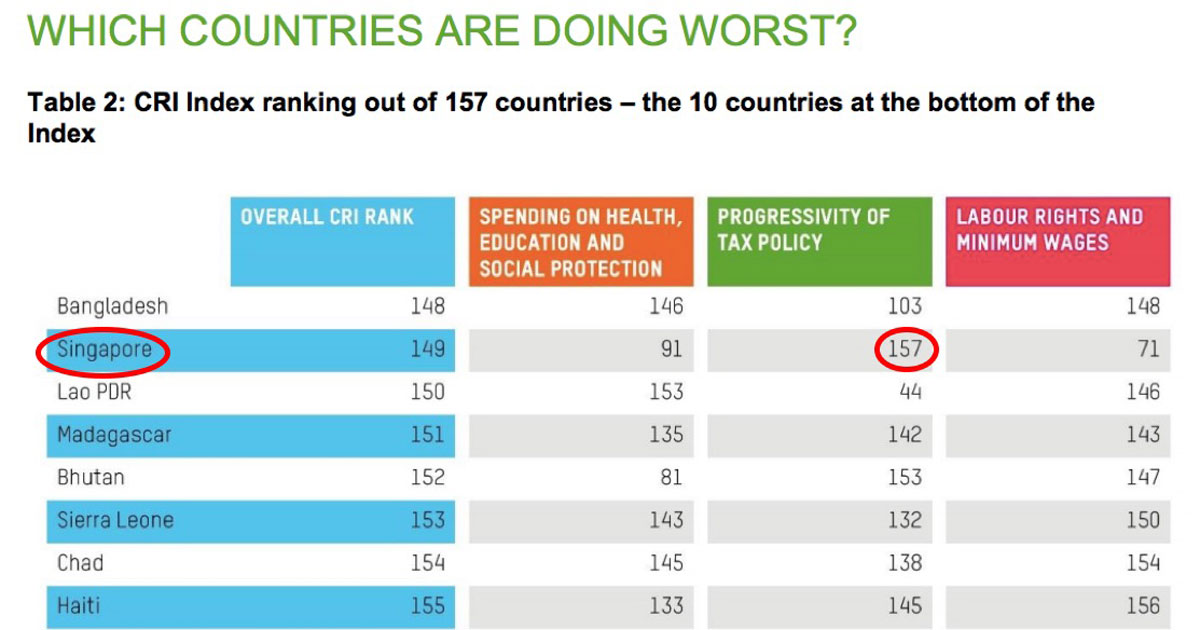There's a report from the American branch of a UK-based charity called Oxfam that ranked Singapore at the bottom 10 out of 157 countries in terms of its commitment to reduce inequality:
And naturally, there were a good number of SMH comments that followed:
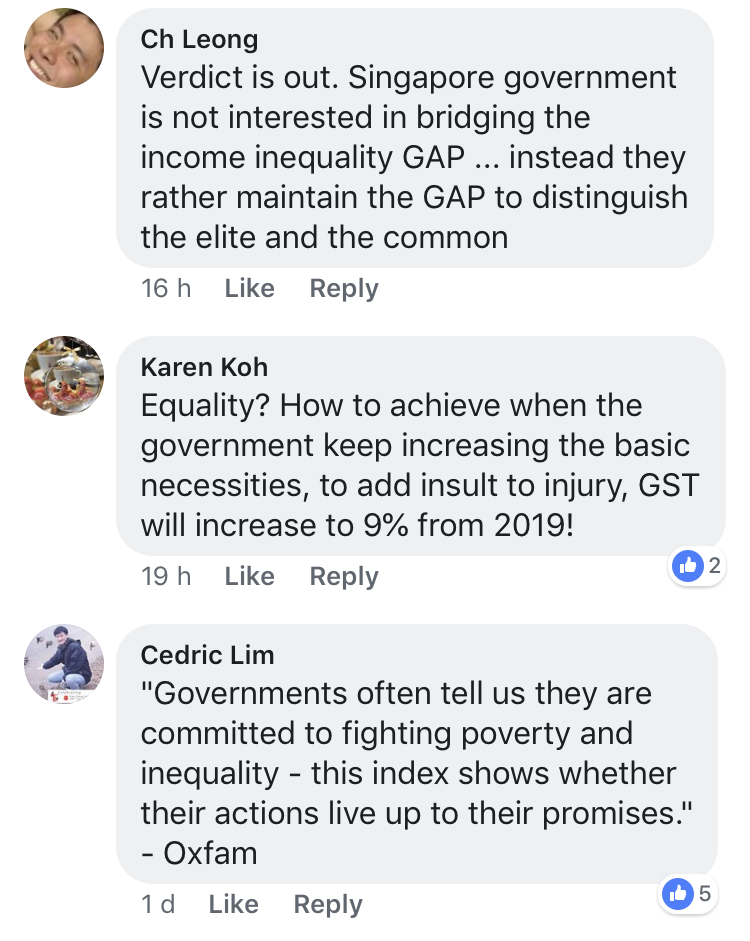
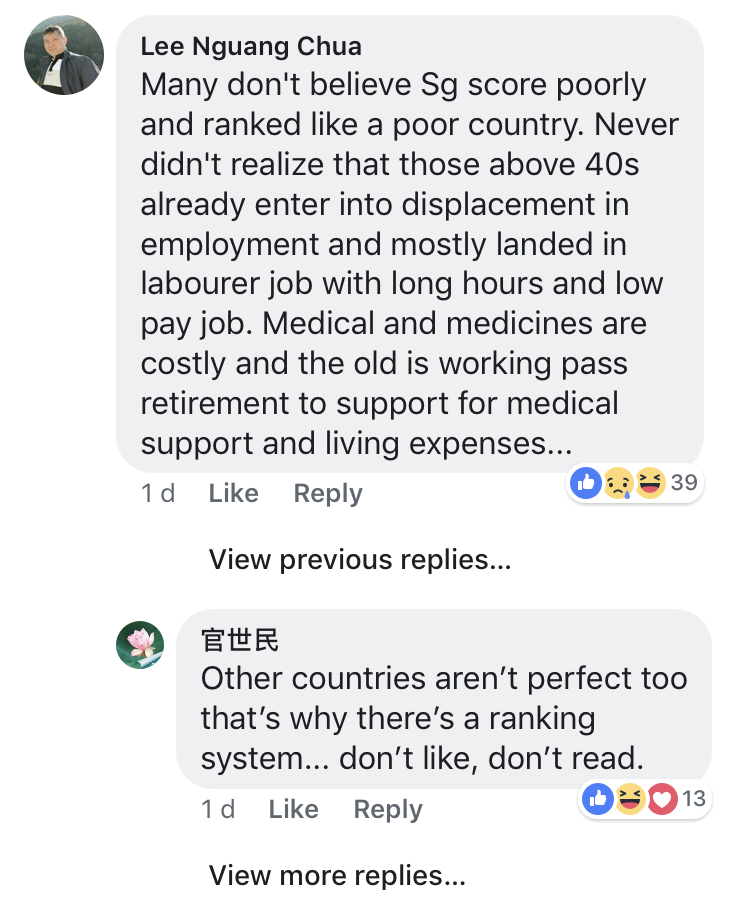
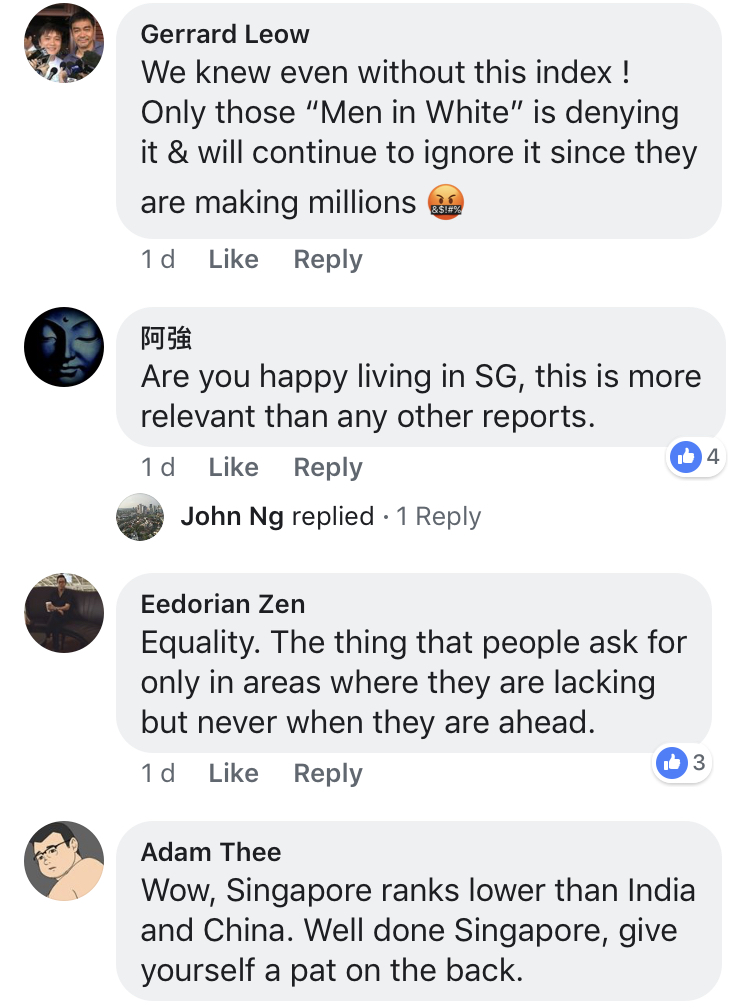
Not too surprising, we'd say.
[related_story]
But...
Now, at least two Singaporeans and a Minister have spoken out against the integrity of the Oxfam index and how it was built.
One is regular commentator and former Nominated Member of Parliament Calvin Cheng, who pointed out that in this case, the messenger is one worth scrutinising alongside the message:
In brief, he notes two things about Oxfam:- Even in the UK, it's criticised as biased, radical left-wing and anti-capitalist
- It's funded by George Soros and Open Society Foundation
And also points out that having a better absolute standard of living for Singapore's poorest is far more important than having lesser inequality.
"We should make sure our poor and even our average Singaporeans have good standards of living, regardless how they compare to rich Singaporeans."
Response from Minister Desmond Lee
On Tuesday evening, the Minister for Social and Family Development Desmond Lee responded with a statement that said, in summary, the following:
- That the Oxfam index assumes that high taxation means a high commitment to reducing inequality, and Singapore's taxation is low (almost half the population doesn't pay tax), but that same half benefit "more than proportionately" from the infrastructure and social support provided by the state.
- That no other country comes close to Singapore in terms of home ownership — among the poorest 10 per cent of Singaporeans, 84 per cent own their own homes, far above any other country.
- That we spend very little (4.6 per cent) on healthcare, Oxfam points out, but the Economist Intelligence Unit ranks us number two in the world for healthcare outcomes, and the World Health Organisation ranks our system 6th in the world. Our life expectancy at birth is also longer than that of Britain and the U.S., and our infant mortality is among the world's lowest.
- That even though we don't have a minimum wage, there are schemes that support lower-income workers, and a progressive wage model for cleaners and security guards, for instance. He also adds that our lower and median-income households saw faster wage increments over the past decade than similarly-paid households in other countries.
"That we achieved all of this with lower taxes and lower spending than most countries is to Singapore's credit rather than discredit. We set out to achieve real outcomes for our people — good health, education, jobs and housing — rather than satisfy a collection of ideologically driven indicators."
Calling out point-by-point
The second prominent Singaporean to speak out at length is local poet Joshua Ip, who is more likely to be on the opposite end of the political spectrum to Cheng.
Interestingly, Ip's post was way longer than Cheng's — a take-down, almost point-by-point, of Oxfam's analysis and reasoning for putting Singapore in the bottom 10 of its index, and backing up Lee's statement, which did receive critique from several quarters as "evasive".
Ip said he acknowledges that Singapore does have issues with inequality, and that we are in the bottom half of countries in terms of how committed we appear to be in reducing it.
Like Cheng and Minister Lee, Ip attacks their dubious methodology — although he also stresses it's valuable to understand their approach as opposed to dismissing it.
We break it down for you:
1) Key reason for bottom 10 ranking: dead last for taxation
Ip notes that Singapore is ranked 157/157 because of our low top income tax rates (22 per cent as our highest bracket). He adds, as Lee does, that after exemptions more than half of our citizens don't pay income tax.
"Oxfam will argue that regimes like Afghanistan and Yemen , which don't even have an effective tax collection and redistribution system due to um, conflict, have more progressive taxation than Singapore, and hence have greater commitment to reducing inequality. As for Sudan and Myanmar, I don't know where genocide fits into reducing inequality or progressive taxation in this index but I guess it isn't there."
We were also marked down because of the business-friendly incentives we have in place for various industries, described by Oxfam as "harmful tax practices".
"Ideologically, I can get where they're coming from. Commonsensically, I'm flabbergasted."
2) Outright fake news
The index, Ip observes, published outright inaccurate information about our education and healthcare expenditure.
Oxfam named Singapore as one of the countries to see the biggest year-on-year decreases in spending on education. Ip also notes that they claimed Singapore saw the 10th highest decrease in healthcare spending (2.06 per cent decline, apparently).
Here's what our budget figures from last year show:
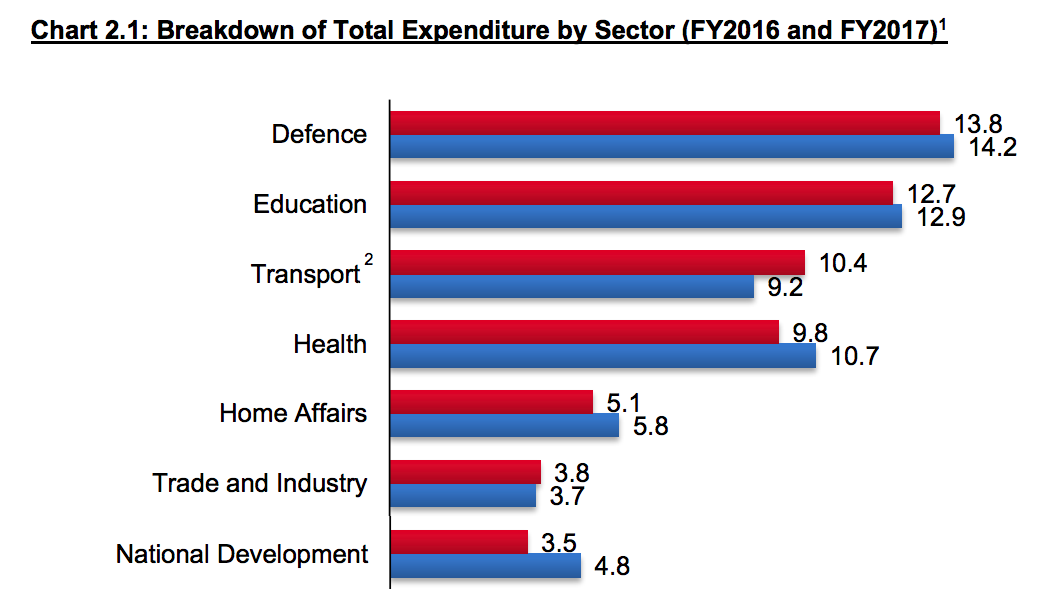 Screenshot via
Screenshot via
The red bar refers to 2016, and the blue bar refers to the budgeted amounts for 2017.
(Editor's note: In a follow-up edit to his original post, Ip notes that he mistook the Oxfam report figures to refer to absolute expenditure change as opposed to the percentage change in amount spent, relative to the entire budget, so those figures quoted by Oxfam were accurate.)
3) On the government's expenditure on housing
Extracted from page 29 of the report:
"Housing costs are the largest item in the budgets of many poor families across the world.
So government spending on subsidized housing can dramatically increase their disposable income; as a result, this spending (especially on construction and maintenance of social housing) has reduced income inequality even more than spending on education, health or social protection."
Also from the same page, and in the very same box:
"Government spending on housing investment (i.e. construction and maintenance) is only partly included in the CRI – housing benefit payments are included, but spending on housing construction and maintenance is not."
Ip's response:
"Guess who this privileges? Oh, the western developed countries with sh*tty or no public housing, all at the top of the list."
See Ip's better-written post here:
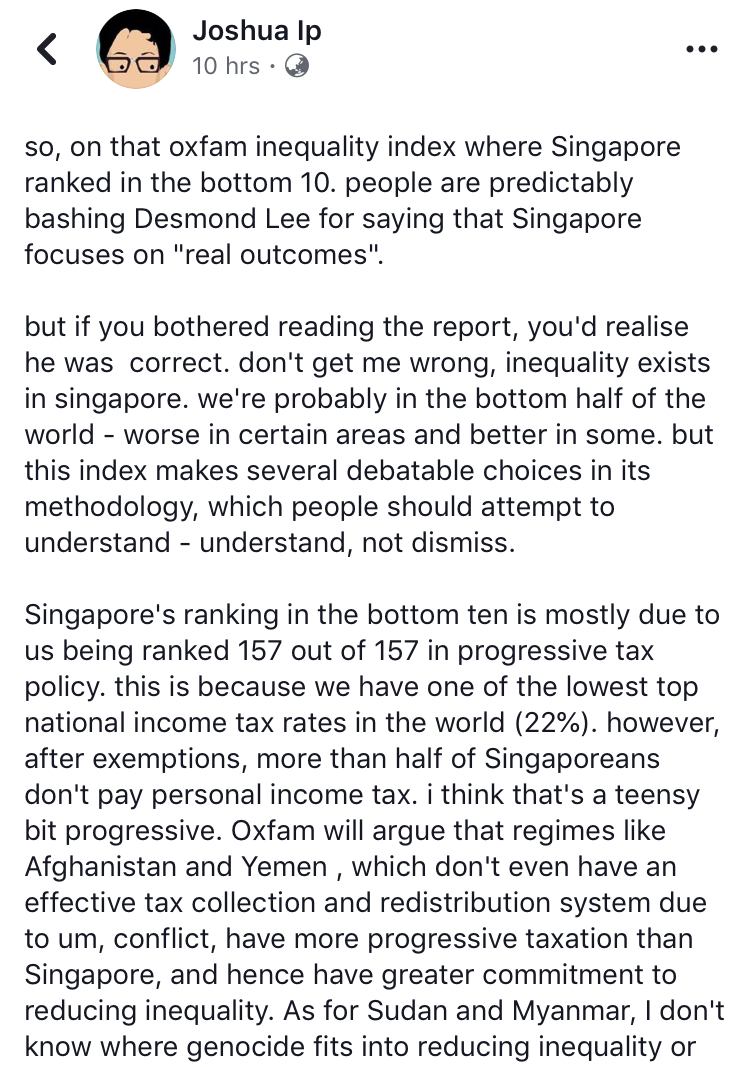
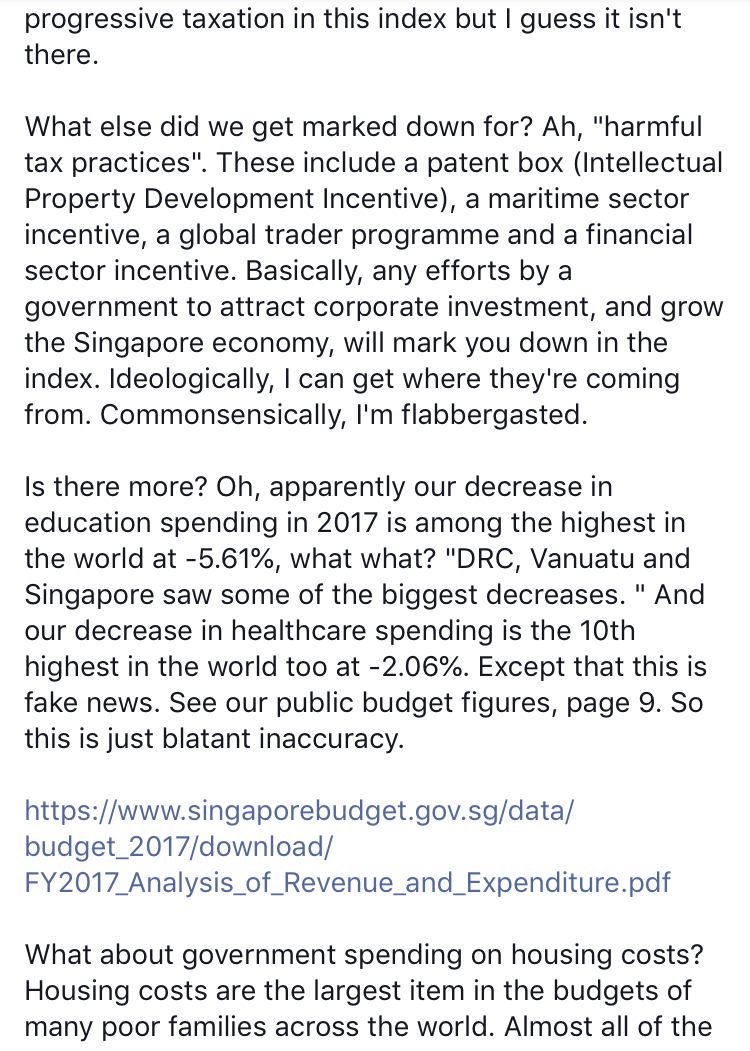
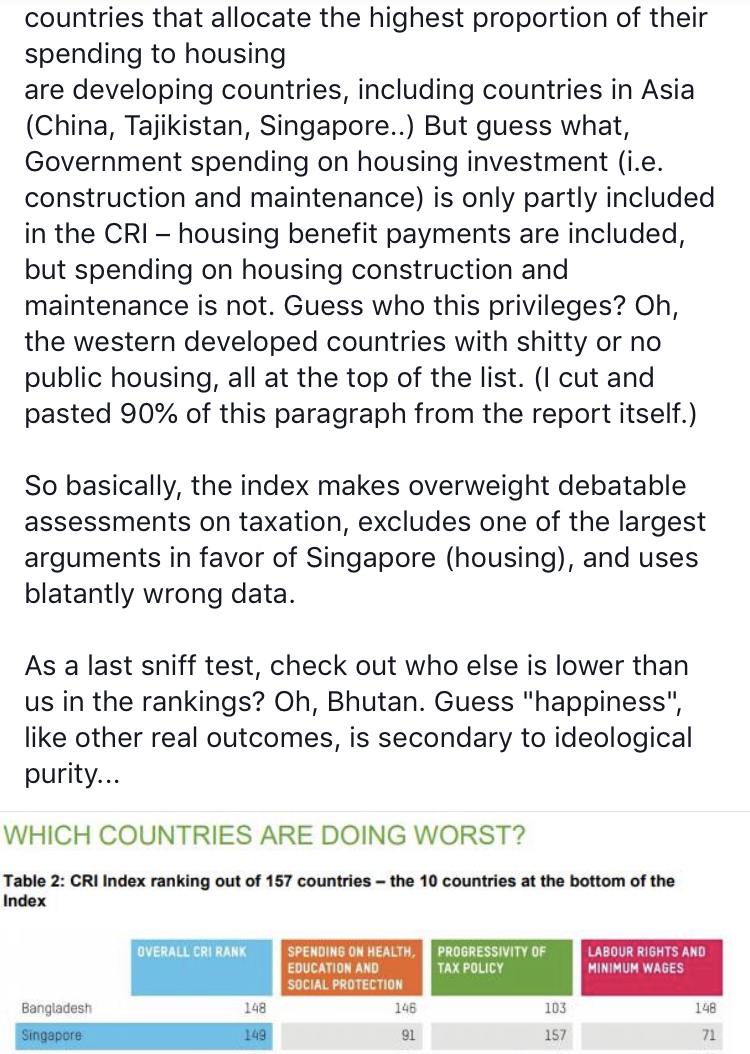
Related article:
Top photo adapted via screenshot from Oxfam report
If you like what you read, follow us on Facebook, Instagram, Twitter and Telegram to get the latest updates.
